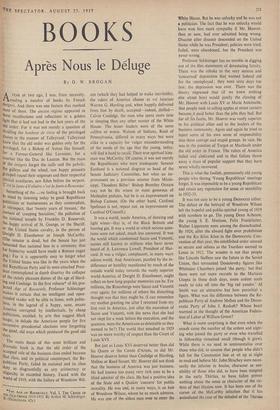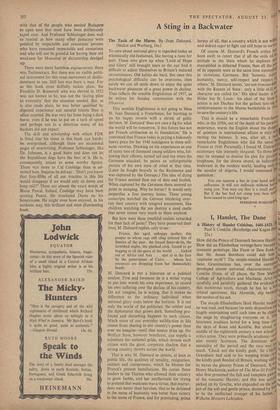BOOKS
Apres Nous le Deluge
By 1). W. BROGAN A YEAR or two ago, I was, from necessity, .,.reading a number of books by French emigres. And there was one feature that marked Most of them. The ancien regime appeared in these recollections and reflections in a golden light that it had not had in the last years of the old order. For it was not merely a question of recalling the bonheur de vivre of the privileged classes in the manner of Talleyrand. Talleyrand knew that the old order was golden only for the privileged, for a Bishop of Autun like himself, for a Farmer-General like Lavoisier, for a courtier like the Duc de Lauzun. But the mass of the emigres forgot the faille and the gabelle, the galleys and the wheel, saw happy peasants grouped round their seigneurs and their respectful clerical auxiliaries, saw Eden before the serpent. 'C'est la faute a Voltaire, e'en la faute a Rousseau.'
Something of the feeling is brought back to mind by listening today to good Republican Politicians or businessmen as they contemplate, in retrospect, that `twenty years of treason,' the menace of 'creeping Socialism,' the pollution of the national temple by Franklin D. Roosevelt, the happy arrival of St. George, or the Sheriff, or the United States cavalry, in the person of bvvight D. Eisenhower or Joseph McCarthy. (The senator is dead, but the Senate has just lamented that national loss in a ceremony that for hypocrisy would have made a Roman augur gag.) For it is apparently easy to forget what the United States was like in the years when the old Republican Party and its semi-attached Presi- dent contemplated in dumb disarray the collapse Of the stately pleasure domes of the age of Hard- ing and Coolidge. In the first volume* of his,pro- jected Age of Roosevelt, Professor Schlesinger !flakes it certain that no intelligent and open- Minded reader will be able to listen, with polite- ness, to the legend of a happy, sane, secure America corrupted by intellectuals, by cheap Politicians, enabled, by arts that suggest black to delude the American people for five successive presidential elections into forgetting the good, old ways which produced the good old The main thesis of this most brilliant and dramatic book is that the old order of the accepted rule of the business class ended because that class, and its political counterpart, the Re- Publican Party, failed its national and its class duty as disgracefully as any aristocracy or oligarchy in recorded history. Faced with the World of 1919, with the failure of Woodrow Wil- *THE Aoi OF ROOSEVELT. VOI. I. THE CRISIS OE OLD ORDER 1919-1933. By Arthur M. Schlesinger. Jr. (Heinemann. 42s.) son (which they had helped to make inevitable), the rulers of America choose as roi faineant Warren G. Harding and, when happily delivered from him by death, accepted—indeed, deified— Calvin Coolidge, the man who spent more time in sleeping than any other master of the White House. The lesser leaders were of the same calibre or worse. Watson of Indiana, Reed of Pennsylvania, differed in many ways but were alike in a capacity for vulgar misunderstanding of the needs of the age that the young, today, will find it hard to recall. Their true spiritual kins- man was McCarthy. Of course, it was not merely the Republicans who were inadequate. Senator Eastland is a national disgrace as head of the Senate Judiciary Committee, but what an im- provement on a previous senator from Missis- sippi, Theodore Bilbo! Bishop Bromley Oxnam may not be the wisest or most generous of Methodist prelates, but he is an improvement on Bishop Cannon, (On the other hand, Cardinal Spellman is not, repeat not, an improvement on Cardinal O'Connell.) It was a world, inside America, of dancing and light wines—that is, of the Black Bottom and bootleg gin. It was a world in which serious ques- tions were not asked, much less answered. It was the world which condemned Sacco and Vanzetti, names still known to millions who have never heard of A. Lawrence Lowell, President of Har- vard. It was a vulgar, complacent, in many ways odious world. And Americans, puzzled by the in- difference or hostility manifested by much of-the outside world today towards the vastly superior world-America of Dwight D. Eisenhower, might reflect on how long popular memories can be. For millions, the Rosenbergs were Sacco and Vanzetti over again; for millions of others the disturbing thought was that they might be, (I can remember my mother greeting me after I returned from my first visit to America, just after the execution of Sacco and Vanzetti, with the news that she had not slept for a week before the execution, and the question, were the Americans as detestable as they seemed to be?) The world that smashed in 1929 was no more worthy of respect than the Court of Louis XVI.
But just as Louis XVI deserved better than did his Queen or the Comte d'Artois, so did Mr. Hoover deserve better than Coolidge or Harding, Mellon or Reed Smoot. Mr. Hoover did not think that the business of America was just business. He had known too many very rich men to be a blind admirer of the class. He had a positive idea of the State and a Quaker 'concern' for public morality. He was and, in many ways, is an heir of Woodrow Wilson, whom he so much admires. He was one of the ablest men ever to enter the White House. But he was unlucky and he was not a politician. The fact that he was unlucky would have won him more sympathy if Mr. Hoover, then or now, had ever admitted being wrong. Disaster after disaster descended on the United States while he was President; policies were tried, failed, were abandoned, but the President was never wrong.
Professor Schlesinger has no trouble in digging out of the files statements of devastating fatuity. There was the rebuke to the very serious and `concerned' deputation that wanted federal aid for the unemployed : they were sixty days too late; the depression was over. There was the theory expressed that (if we knew nothing else about him) would justify the classing of Mr. Hoover with Louis XV or Marie Antoinette, that people took to selling apples at street corners because,it paid better than the jobs they had. But for all his faults, Mr. Hoover was vastly superior to his political allies and to the leaders of the business community. Again and again he tried to inject some of his own sense of responsibility into these corrupt and stupid groups. In vain. He was in the position of Turgot or Machault under the old order in France. The rulers of America failed and abdicated and in that failure threw away a mass of popular support that they have never wholly recovered.
This is what the foolish, prematurely old young people who throng 'Young Republican' meetings forget. It was impossible to be a young Republican and retain any reputation for sense or sensibility in 1932-33.
It was not easy to be a young Democrat either. The defeat or the betrayal of Woodrow Wilson left the hopeful and public-spirited young of 1919 with nowhere to go. The young Dean Acheson, the young S. E. Morison, Felix Frankfurter, Walter Lippmann were among the disenchanted. By 1924, after the absurd fight over prohibition and the Ku Klux Klan in the Democratic Con- vention of that year, the established order seemed as secure and odious as the Tsardom seemed to Lenin in 1912. The wonder is not that people like Lincoln Steffens saw the future in the Soviet Union; that tormented Dostoievsky figures like Whittaker Chambers joined 'the party,' but that there were not more recruits to the Marxian Utopia in those drab days, more ardent souls ready to take off into the 'big red yonder.' Al Smith was an attractive but how parochial a figure. What was the difference between the Re- publican Party of Andrew Mellon and the Demo- cratic Party of John J. Raskob? Whose heart warmed at the thought of the American Federa- tion of Labor of William Green?
What is more surprising is that even when the smash came the number of the ardent and aspir- ing who joined the party or even who travelled in fellowship remained small (though it grew). While there is no need to sentimentalise over those who did, to assume that people who didn't fall for the Communist line or sit up at night to read and believe Mr. John Strachey were neces- sarily the inferior in brains, character or sen- sibility of those who did, to have been tempted in the early Thirties, to have fallen proves nothing about the sense or character of the vic- tims of that illusion now. It has been one of the curses of the McCarthy infection that it has assimilated the case of the deluded of the Thirties with that of the people who needed Budapest to open eyes that must have been deliberately taped over. And Professor Schlesinger does well to remind us how many other panaceas were peddled by respectable and censorious' persons who have remained respectable and censorious and who will not be grateful for having their old weakness for Mussolini or dictatorship dredged up.
There were more harmless engoaements: there was Technocracy. But there was no visible politi- cal instrument for this mass movement of disillu- sionment to use. Still less was there a man. For as this book most skilfully makes plain, the Franklin D. Roosevelt who was elected in 1932 was not known to be, was not the 'daring pilot in extremity' that the situation needed. But, as is also made plain, he was better qualified by digested experience and natural talents than is often asserted. He was very far from being a dark horse, even if he was to put on a turn of speed and perhaps run in a direction many of his backers did not expect.
The skill and scholarship with which FDR is fitted into his times in this book can hardly be overpraised, although there are occasional pages of overwriting. Professor Schlesinger, like Dr. Johnson, is a good hater and does not let the Republican dogs have the best of it. He is, consequently, unjust to some worthy figures. There was more to Cal Coolidge than is ad- mitted here. Suppose he did say : 'Don't you know that four-fifths of all our troubles in this life would disappear if we would only sit down and keep still?' These are almost the exact words of Blaise Pascal. Indeed, Coolidge may have been quoting Pascal. He translated Dante on his honeymoon. He might even have enjoyed, in his sardonic way, this brilliant and most illuminating book.































 Previous page
Previous page